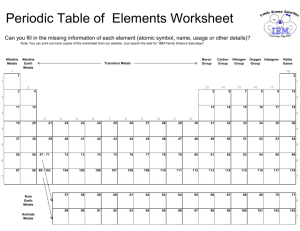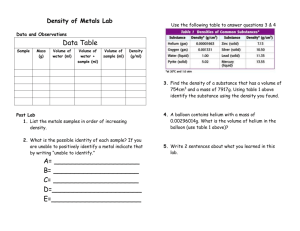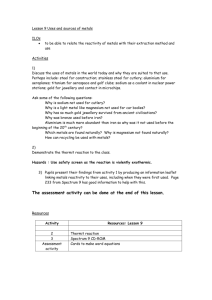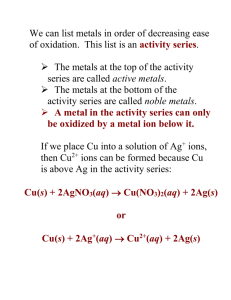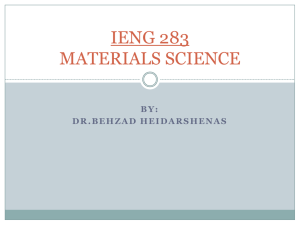Detection of refractory materials from combustion processes by soot-
advertisement
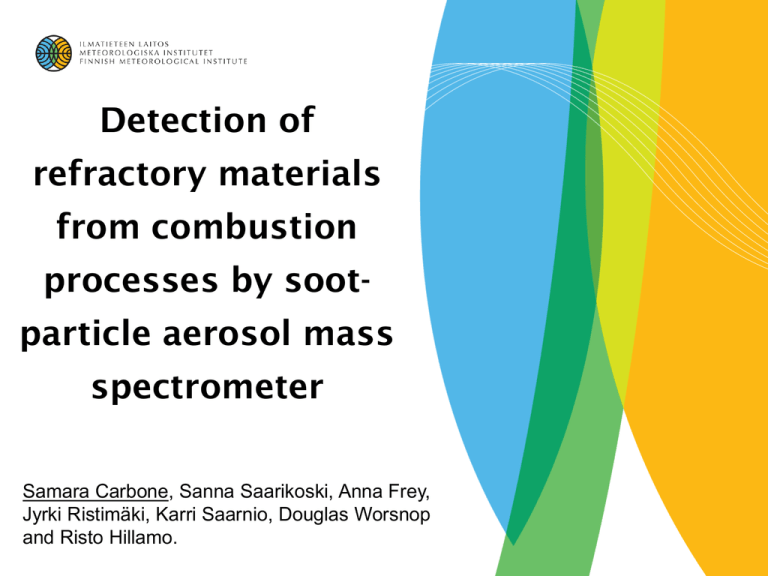
Detection of refractory materials from combustion processes by sootparticle aerosol mass spectrometer Samara Carbone, Sanna Saarikoski, Anna Frey, Jyrki Ristimäki, Karri Saarnio, Douglas Worsnop and Risto Hillamo. Introduction PM1 chemical composition sulfate nitrate ammonium chloride organic inorganic 2 Objectives Evaluation of the feasibility in detection of trace metals and soot in real-time with the SP-AMS. Application in different combustion processes: a fired-oil heating station and a diesel engine. 3 Methodology In the laboratory: (Aerodyne Res. Inc., Onasch et al., 2012) 4 Methodology In the laboratory: mM mW mM Drier mrBC mrBC Mass ratio mmetal / mrBC is the same in the mM mw mM = Z x mrBC mrBC solution and particle phase mM =Z mrBC (0.04 – 0.32%) mrBC = CPC x V x ρ = CPC x PI x (300E-7)3 x 0.9 x 1E12 / 6 More information: Carbone et al., 2014, (Characterization of metals with the SP-AMS: detection and quatification) 5 Results In the laboratory: How to identify trace metals? measured x 100% reference Reference: NIST database 6 Results In a oil-fired heating station: Different boilers At different power conditions: 30, 47, 78, 120 MW. Different fuels: Heavy fuel oil (HFO) Light fuel oil (LFO) 7 Mass concentration µg m-3 Chemical composition in real time 8 Average composition in the Boiler #4 organics sulfate rBC metals LFO rBC, metals HFO sulfate 9 On average the refractory material was dominant sulfate organics V metals Ca rBC Na Fe More information: Ni Frey et al., 2013, 48 (1), pp 827-836(ES & T) Happonen et al., 2013, 47 (24), pp 14468–14475 (ES & T) 10 Results From a diesel engine: Ultra-low sulfur diesel fuel (8ppm) Engine type: medium speed At 6 different engine load points: 882, 643, 351, 125, 88, 0 kW Dilution: hot primary dilution with a mass flow controlled flow, secondary dilution with the ejectors. 11 Multi-angle absoprtion photometer (MAAP) Filter smoke number (FSN) Soot-particle arosol mass spectrometer (SP-AMS) Measured BC a) 5 MAAP vs FSN MAAP mg m -3 y = 0.729x + 0.044 2 4 R = 0.991 3 2 1 0 b) 4 y = 0.834x - 0.14 2 SP-AMS vs FSN SP-AMS mg m -3 R = 0.979 3 2 1 0 1 2 3 -3 FSN mg m 4 5 More information: Saarikoski et al., 2012, AAAR 12 13 14 Conclusions A method was developed, the metals were detected and quantified. The refractory material was measured in real time. The refractory material in two different combustion processes was very significant. The metals represented a very small fraction in the the diesel engine emissions, however up to 16% in the oil-fired heating station. 15 Thank you for your attention! Contact: samara.carbone@fmi.fi risto.hillamo@fmi.fi 16
